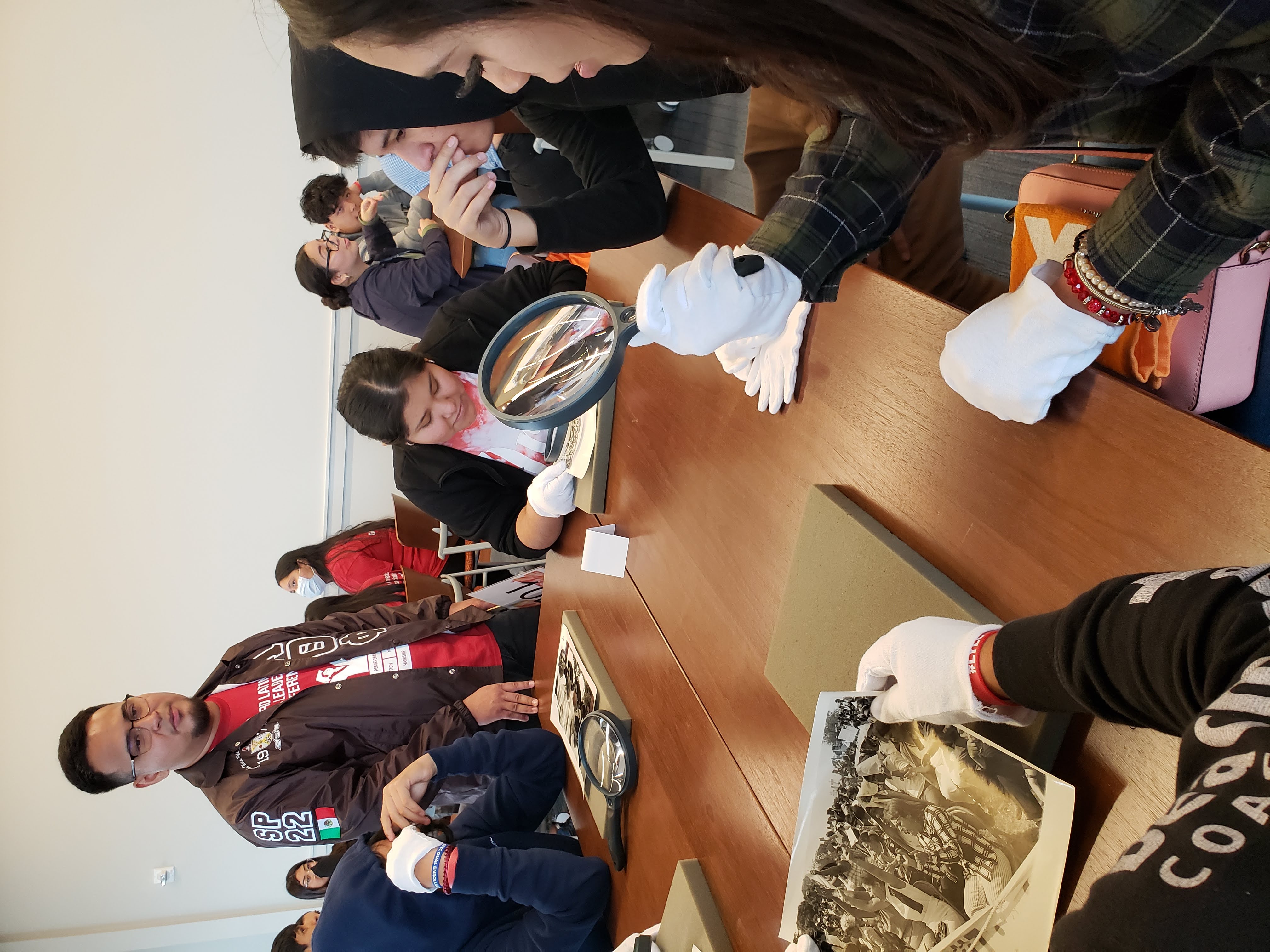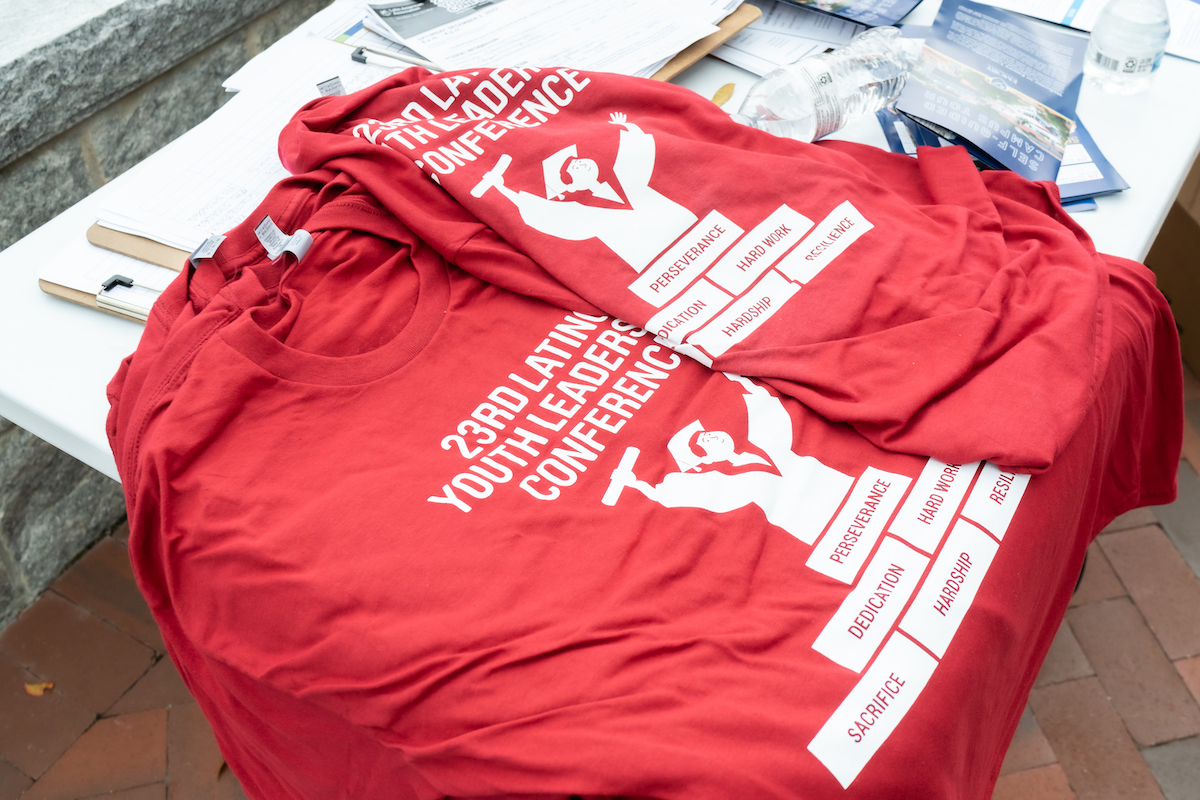The Latin American Association (LAA) started its Latino Youth Leadership Conference (LYLC) with one goal: to encourage more Latino students to go to college. Decades of research show that higher education greatly aids in socioeconomic mobility, and for students who are often first-generation Americans, a degree can make a huge difference for them and their families. This year, the 23rd annual conference was held on Saturday, Dec. 3, at Emory University for the seventh time in its history.
This was the first in-person conference since the pandemic. Being back in person is especially important for these students because many of the families served by the LAA were hit hard economically by the pandemic. Eli Vélez, managing director of youth services at the LAA, and Luis Andino, program manager at the LAA, say that the conference is meant to inspire hope and remind students that college is not off the table just because of their background.
“Many of our students were forced to work a lot during the pandemic years to help their families,” says Vélez. “They were deciding whether to go to college or to help their families.”
“Typically, our students don’t have an immediate circle of people who understand financial aid or college admissions,” adds Andino. “That’s where counselors and teachers come into play, but with the pandemic they didn’t have as much access as they normally would have.”
Access is at the core of the LYLC. Latino middle- and high school students have access to Emory’s campus as well as Emory students, who are where they may want to be. One of the conference highlights is the college and career fair, where the high school students and their parents interact with admission representatives from 20 colleges and universities throughout the state of Georgia, including Emory.
The planning committee for this year’s conference was chaired by Vélez and Vialla Hartfield-Méndez, professor of practice in Emory’s Department of Spanish and Portuguese and director of engaged learning at the Center for Faculty Development and Excellence (CFDE). Other Emory planning committee members included Taína Figueroa, assistant director in the Office for Racial and Cultural Engagement (RACE); Kendra Price, associate director of community programs in the Office of Government and Community Affairs; and Jareka Dellenbaugh-Dempsey, graduate assistant for engaged learning in the CFDE.
The conference brings together several different areas on the Emory campus, including the Department of Spanish and Portuguese, the Latin American and Caribbean Studies Program and Campus Life.
Emory alumni, graduate and undergraduate students as well as students from other universities in Georgia serve as mentor guides and workshop facilitators throughout the day. Hartfield-Méndez believes this is one of the most important aspects of the conference.
“All of us understand that it’s important not just to see someone who is like you in a role, but also to be able to have a conversation and hear about their path,” says Hartfield-Méndez. “To be able to imagine oneself on a similar path is critical. That’s why we do orientations for the mentor guides where we emphasize safety and encourage them to share their stories and hear the students’ stories.”
College for a day
This year, more than 600 Latino students from schools across the state of Georgia heard from keynote speakers and participated in interactive, age-appropriate workshops on the Emory campus. The Carlos Museum, Emory Libraries, the Planetarium and Nell Hodgson Woodruff School of Nursing were among the Emory units that offered sessions for them.
Nursing professor Roxana Chicas helped to plan a program where ninth graders had a chance to visit the School of Nursing and learn basic first-aid skills as well as how to place a tracheostomy tube. The session was led by current Emory nursing students, including Fabiane Sencion, who is in the family nurse practitioner program.
“The session is not just about introducing the students to the nursing profession and all the wonderful opportunities that come with it,” says Sencion. “Everyone who participated in making this event happen believes in the power and the possibilities within the Latinx community — the power and the possibilities within each and every one of these students.”
Tenth graders had the chance to meet fourth-year student Arturo Contreras and history professor Yami Rodriguez, who collaborated on the Emory Libraries’ exhibition “Consciousness Is Power: Emory Latinx History.” In one part of the dual session Rodriguez taught, students learned about Mexican and Puerto Rican participation in social justice movements using materials from the Rose Library archives. In the other part, Contreras, who is majoring in Latin American and Caribbean Studies, led students through an activity where they considered their intersecting identities (race, gender, nationality, etc.) to then imagine how they might create their own personal archives.
“I hear a lot of students say that seeing a Latina professor makes them feel like they could be a professor,” says Rodriguez, who first volunteered at the LYLC when she was an undergraduate student at University of Georgia. “We’re having students look at history as something you can study and as something we live every day.”
Meaningful mentorship
Centro Latinx, an identity space within Campus Life, is one of the main places where Latinx students find community at Emory. Centro Latinx sits in the Office for RACE within Campus Life. The organization provides social engagement for Latinx students as well as a space for students to share resources, participate in community service and advocate for Latinx students on campus. Several students in Centro Latinx served as mentor guides on Saturday.
Students learned about the roles Mexicans and Puerto Ricans played in social justice movements by looking through the Emory archives.
“I wanted students to be more involved this year because a lot of Emory students don’t get to be in the community while they’re here,” says Figueroa, who is also a PhD student in the Department of Philosophy. “They may go to Plaza Fiesta every once in a while, but there aren’t a lot of opportunities for them to be around people who are like where they grew up. This is a space where they can connect with young folks who are similar to how they were when they were younger.”
Andy Espinoza, a student in the nurse anesthesia program, knows the importance of mentorship. Espinoza grew up in Cartersville, Georgia, with his siblings and parents, who are both Mexican immigrants. He experienced homelessness in high school and said that his mentors showed him that he was bigger than his circumstances. Espinoza earned his bachelor’s degree in nursing at Georgia State University and is the second year of his program at Emory.
“I had mentors who helped me see the good aspects of myself that I could not see,” says Espinoza. “I never really believed I could get into school due to cost, but my mentors helped me overcome those obstacles. I hope to promote the field of nursing and highlight its benefits and opportunities especially to the Latinx community. There is a huge need for Latinx health care providers, and I want to show that it is absolutely possible to advance in a career in nursing despite disadvantaged circumstances.”
New horizons
During the past 22 years, 25,000 Latino students across the state of Georgia have attended the conference. Many have graduated from Emory and are at Emory right now. This fall, about 9.3% of Emory students identify as Hispanic or Latino.
Ensuring that students and families feel welcome on campus when they are in middle and high school is a critical first step in the journey to higher education.
“I want students to feel like this is also a space for them, like this is where they belong,” says Figueroa. “I want them to be able to see other people who look, sound and speak the same languages as them here and not have it feel like a foreign place.”
“One hundred percent of students leave the conference with a different mindset,” said Vélez. “They leave motivated to find their own path to be successful in life. We have many success stories.”
Student groups and identity spaces at Emory




